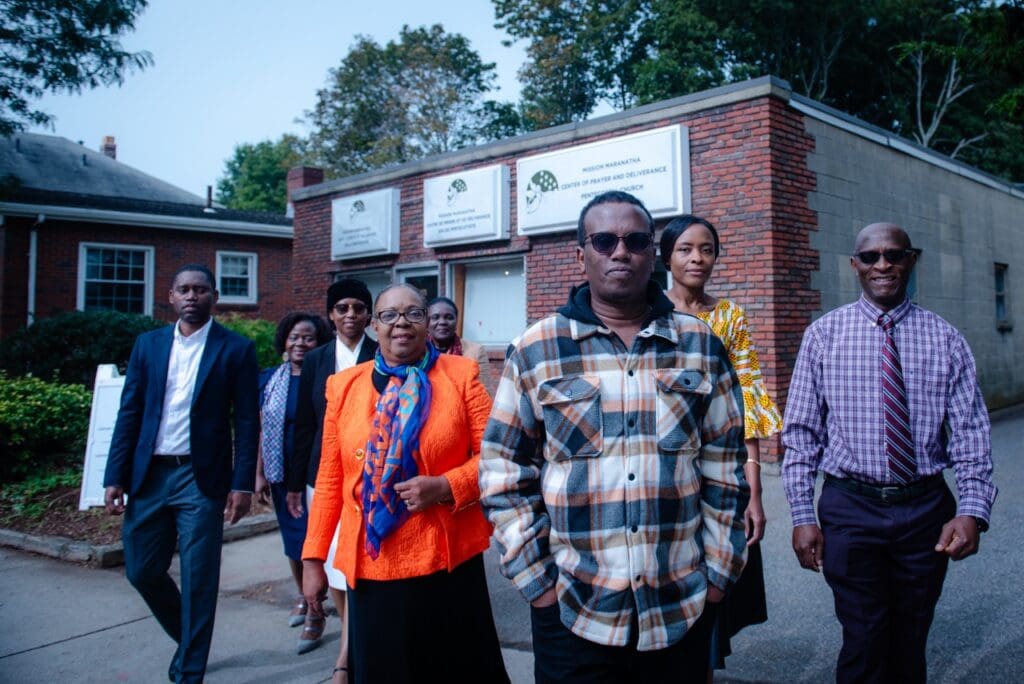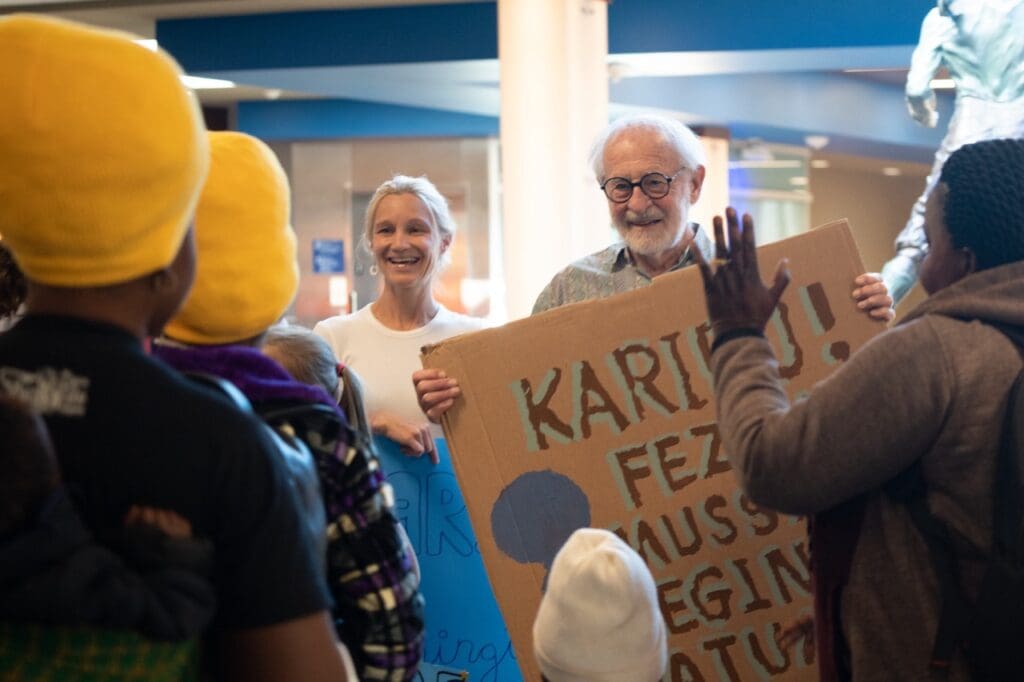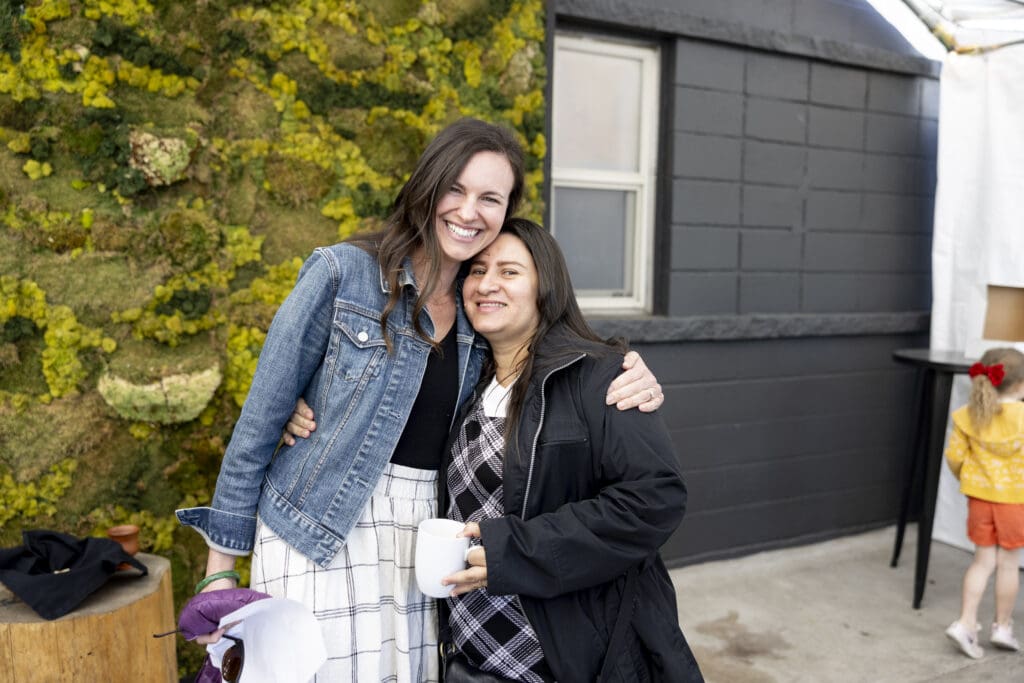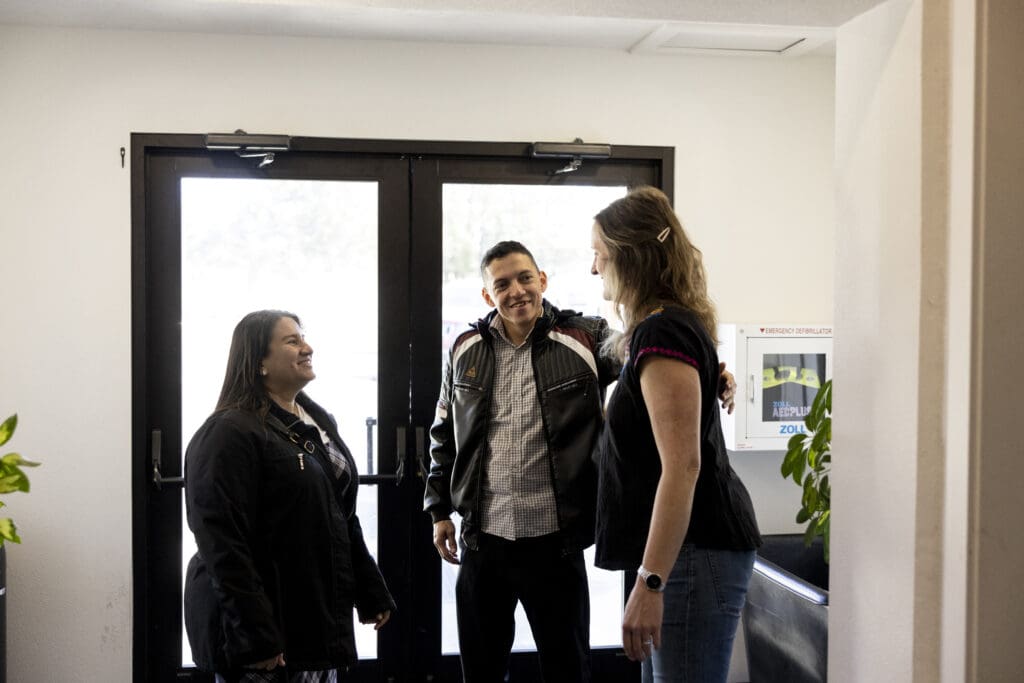Sponsorship Duties
Helping refugees rebuild their lives in a new country is an incredibly rewarding experience that takes a good deal of preparation and planning. To ensure the refugee individual/family gets the support they need, you and your team commit to providing a specific set of core services for their first 90 days in the country.
When applying, your Group Coordinator will be asked to fill in relevant information about these services in the application. As you plan for sponsorship, the guide below will help you locate resources in your community and make sure you have these key commitments covered.
On this page
Preparation

Financial support
Your role
More about financial support
Key considerations
- The funds you raise will go towards housing and providing basic necessities like furniture and household goods, clothing, baby and/or children’s items, pocket money for the first 30 days, and food or food allowance until Supplemental Nutritional Assistance is available or refugee(s) can cover costs themselves.
- At least 60% of $2,425 ($1,455) must be in cash, while the rest of the funds can be a combination of cash and donated items and services.
Resources
- Learn more about fundraising and how to show proof of funds here.
- The Sponsor Fund, through the generous support of private funders and in partnership with GoFundMe, provides financial assistance to sponsor groups applying to be matched with refugees they do not know through the Welcome Corps.
Get started
- To apply, you will need to upload documentation that shows you have 60% of the required funds ($1,455 per refugee).
Sponsor groups prepare to cover expenses for the 90-day sponsorship period at a minimum of $2,425 per refugee. To apply, you will need to upload documentation that shows you have 60% of the required funds ($1,455 per refugee).
Housing and transportation
Your role
Sponsors plan to help refugee(s) access transportation and ensure they have safe, affordable housing over the length of the initial sponsorship period.
More about housing and transportation
Key considerations
- Consider the cost of utilities and proximity to public transportation, schools, shopping, and jobs.
- Think about other requirements and fees, such as security deposits, previous landlord references, credit scores, or proof of income, and how you can help the refugee(s) navigate these requirements.
- The goal is for newly arrived refugees to take over rent payments at the end of the 90 days.
Resources
- Refugee Housing Solutions (RHS) works to expand access to quality housing for refugees. Check out their website for resources, training, and support.
- Learn more about how to plan for housing here.
Get started
- Identify how refugee(s) might travel (bus, metro, rideshare, taxi, or walk) to and from possible employment, schools, healthcare, places of worship, shopping centers, and grocery stores.
- Identify how refugee(s) will travel in cases where there is no public transit available.
Early days

Airport reception
Your role
Sponsors greet refugee(s) at the airport and drive them to their initial housing.
More about airport reception
Key considerations
- Travelers will likely be tired after a long journey, so we recommend a smaller group meet them when they arrive.
- Make sure language interpretation is available at the airport. This can be a group member, member of your community, or professional/phone interpretation services.
- If needed, ensure car seats and booster seats are provided for children.
Orientation
Your role
Sponsors provide an introduction to their community and life in the United States. This includes topics like home and personal safety, rights and responsibilities, laws, navigating public transportation, banking, cultural practices, and community resources.
More about orientation
Resources
- County or state human services departments, local city offices for immigrants, and statewide Offices for New Americans can be great first stops.
- The Cultural Orientation Resource Exchange, USA Hello, and the Settle In app offer information for refugee newcomers about life in the United States.
- United Way’s 2-1-1 service and the FindHello app can help you find resources in your area.
Interpretation and translation
Your role
Sponsors communicate with refugee(s) in their language by using translation tools and professional interpretation.
More about interpretation and translation
Key considerations
- You will be helping new arrivals navigate complicated processes like signing up for health care and benefits, so being able to communicate clearly is key. In-person or phone interpretation is required for appointments and discussing important information, while apps like Google Translate or Tarjimly can be used for more casual settings.
- Do not assume that the refugees will speak English.
- Do not assume refugees can read their own language.
- Refugee youth or adults should not translate for other members of their family.
- Note: Agencies that receive federal funds, such as hospitals or health departments, are responsible for ensuring language access.
Get started
- Budget in advance for professional interpretation needs.
- Identify potential sources of affordable or free interpreters available in your community, such as colleges/universities, churches, and cultural groups.
Language
Your role
Sponsors help refugee(s) learn and practice English. This could include English language classes, conversation circles at libraries, tutoring through local literacy groups, or regular conversational practice.
More about language
Key considerations
- When scheduling English classes, consider when classes are offered, their distance from the refugee’s home, accessibility of transportation, and the cost, if applicable.
Resources
- Federal and state governments fund English as a Second Language classes. Look for locations in your community.
- You can access a list of English-language learning resources here.
- Apps like FindHello and Duolingo are great resources as well.
Documentation
Your role
Sponsors help each refugee secure essential documentation:
- state ID
- driver’s license for eligible refugees
- change of address form
- Selective Service registration for males 18-25
More about documentation
Key considerations
- Refugees apply for their Social Security cards overseas as part of their resettlement process, and the cards come after refugees arrive in the United States. Sponsors do not need to apply for this documentation although you may need to take the refugee(s) to the local Social Security office.
- Refugees also apply for Employment Authorization Documents (EADs) overseas as part of their resettlement process and are eligible to work upon arrival using their I-94. Sponsors do not need to apply for this documentation.
Resources
- Take the RWC Documentation and Benefits training. This series of video tutorials introduces documentation and benefits available to refugee newcomers, why they are important, how to apply for them, and how sponsors can provide support in the process.
- Find your local Social Security office here.
Ongoing support

Employment
Your role
Sponsors help refugee(s) find work by introducing them to the American workplace, connecting them with workforce development services, helping them develop short-term and long-term employment goals, and supporting resume preparation and interview practice.
More about employment
Key considerations
- The ultimate goal is for refugees to secure full-time, year-round employment with benefits and become self-sufficient. We recognize how hard it can be to find any job, and the reality is that this will be a process. Though the first job may not directly lead to self-sufficiency, it’s a step in the right direction. A part-time or seasonal job will help refugee adults become familiar with job demands and expectations in the United States.
- Refugees are eligible to work upon arrival by using their I-94 as proof of employment eligibility.
- In some rural communities, it may be necessary to find employment in the nearest large town or city.
Resources
- You can find employment listings on State Department of Labor websites, at your local library, and on job boards such as Welcome Employment.
- Switchboard’s Job Readiness Curriculum empowers newcomers to find and succeed in jobs — offering tools to help them understand work documents, their rights as workers, different career paths, and personal finance.
- The Matching Grant program helps refugees overcome barriers and quickly find jobs.
Benefits and services
Your role
Sponsors help refugee(s) access any public benefits they may be eligible for (e.g., time-limited cash assistance, Supplemental Nutritional Assistance, medical assistance, Supplemental Security Income).
More about benefits and services
Key considerations
Benefits include:
- Medicaid
- Refugee Medical Assistance
- Temporary Assistance for Needy Families (TANF)
- Refugee Cash Assistance
- Supplemental Nutrition Assistance Program (SNAP)
- Special Supplemental Nutrition Program for Women, Infants, and Children (WIC)
- Supplemental Security Income (SSI)
- Case management, ESL, and employment services
- Women’s empowerment programming
- Childcare
- And other support services like Preferred Communities, Matching Grant, and the Survivors of Torture program
Resources
- Depending on your state, you may find information regarding available benefits and services on your state government’s website or by contacting the State Refugee Coordinator’s office.
- RWC’s State Resource Guide provides information about cash and food assistance, health care, programs for English Language Learners, job search assistance, and other valuable resources specific to your state.
- You can also refer to Benefits.gov, United Way’s 2-1-1 service, and the FindHello app.
Get started
- Benefits are managed by various agencies, and can take a long time to process. It is essential to research how you will help refugee(s) apply so that they can submit their applications within one week of arriving in the United States.
Health and mental health
Your role
Sponsors help refugee(s) navigate health care and mental health resources and complete refugee health screening requirements.
More about health and mental health
Key considerations
- You will be responsible for making sure refugees complete a medical screening once they are here. This is different from a routine primary care visit. Since the screening can sometimes take up to 2-3 visits to complete, sponsors should plan to do this within 30 days of their arrival. Typically, medical screenings are conducted by a designated health clinic or health care provider. Your State Refugee Health Coordinator can provide information on where and how to complete these health screenings.
- You may have to use in-person or virtual interpretation when helping refugee(s) access medical care.
Resources
- Some states have people that work to help sponsors and refugees access health coverage options. Try Googling your state + “insurance navigator” or “benefits navigator.”
- You may find relevant mental health resources for your location through SAMHSA, researching local crisis response resources, or on your state’s office of mental health website.
Get started
- Many refugees need access to medical services before receiving Medicaid, CHIP, or Refugee Medical Assistance. They can access care through Federally Qualified Health Care Centers (FQHC) or other low-cost health clinics. Identify the closest FQHC to you here. You will need this information to submit your Welcome Corps application.
- Identify providers— primary care, dental care, and pharmacies — that will accept new patients with Medicaid, CHIP, and/or Refugee Medical Assistance.
- Identify appropriate mental health services, clinics, and/or practitioners familiar with serving refugees in your community.
Education and childcare
Your role
Sponsors help refugee(s) enroll kids in school, locate child development programs, and find childcare.
More about education and childcare
Key considerations
- Children are required by law to attend school. Consult your local school district or state regulations for specific ages and requirements, such as immunizations.
Resources
- Childcare.gov provides information on programs that may be available to help with the cost of child care.
- Head Start and Early Head Start offer low-income families free learning and development services for children from birth to age 5.
- Some school districts may have newcomer centers or community school programs that help students transition to a new learning environment.
Get started
- Make a list of school district contact information and determine if schools in your community provide additional language support or programs for refugee and immigrant students.
Cultural connections
Your role
Sponsors seek out cultural connections for their refugee or refugee family wherever possible — things like cultural foods, houses of worship, or connecting directly with other people who have relocated from the same country.
More about cultural connections
Key considerations
- Cultural connections should be facilitated in collaboration with refugees.
- Remember to never assume that refugees will want to engage with their own religious or ethnic community.
Resources
- If your community has a department or bureau of cultural or multicultural affairs, this may be a helpful place to start.
Get started
- Have resources ready in case refugees are interested. Research and reach out to possible connections in your community.
Transition

Transition from sponsorship
Your role
Sponsor groups plan for the transition from the initial 90-day sponsorship period when their support ends.
More about transition from sponsorship
Key considerations
- Make sure refugee(s) can access support and services during the ongoing integration process.
- Investigate what community services are available that can provide support after your sponsorship period, including through public social service programming, local non-profits, or resettlement agencies.
- Think about how you can continue to mentor refugee(s) if needed after the sponsorship period ends.
Reporting and feedback
Your role
Sponsor groups complete the reports and surveys outlined below to provide the program with feedback and data on sponsorship results and impact.
More about reporting and feedback
Key considerations
- Complete 30- and 90-day reports.
- Complete 6-month and 12-month sponsorship experience surveys.
- Support the process for refugee(s) to complete surveys within 30 days of arrival, at 6 months, and 12 months post-arrival.
- Communicate critical incidents affecting your ability to deliver on sponsor duties and/or any issues that impact refugee safety and wellbeing.
Join the Welcome Corps today!
Begin your application and set out on a journey to change a life — including your own.